八年级英语代词的用法
初二上册英语语法分析--代词和副词的用法讲解
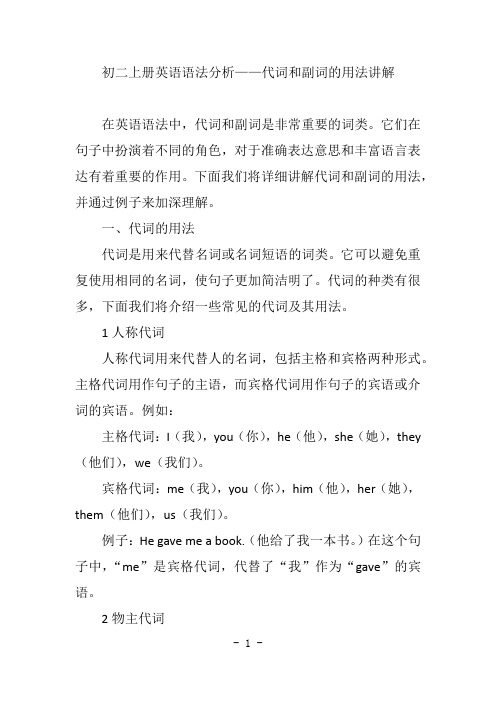
初二上册英语语法分析——代词和副词的用法讲解在英语语法中,代词和副词是非常重要的词类。
它们在句子中扮演着不同的角色,对于准确表达意思和丰富语言表达有着重要的作用。
下面我们将详细讲解代词和副词的用法,并通过例子来加深理解。
一、代词的用法代词是用来代替名词或名词短语的词类。
它可以避免重复使用相同的名词,使句子更加简洁明了。
代词的种类有很多,下面我们将介绍一些常见的代词及其用法。
1人称代词人称代词用来代替人的名词,包括主格和宾格两种形式。
主格代词用作句子的主语,而宾格代词用作句子的宾语或介词的宾语。
例如:主格代词:I(我),you(你),he(他),she(她),they (他们),we(我们)。
宾格代词:me(我),you(你),him(他),her(她),them(他们),us(我们)。
例子:He gave me a book.(他给了我一本书。
)在这个句子中,“me”是宾格代词,代替了“我”作为“gave”的宾语。
2物主代词物主代词用来表示名词的所有关系,包括形容词性物主代词和名词性物主代词。
形容词性物主代词后面要接名词,而名词性物主代词可以独立使用,相当于一个名词。
例如:形容词性物主代词:my(我的),your(你的),his(他的),her(她的),their(他们的),our(我们的)。
名词性物主代词:mine(我的),yours(你的),his(他的),hers(她的),theirs(他们的),ours(我们的)。
例子:This is my book.(这是我的书。
)在这个句子中,“my”是形容词性物主代词,修饰了名词“book”。
3指示代词指示代词用来指示或识别名词或代词,包括this(这个),that(那个),these(这些),those(那些)。
例如:This is a pen.(这是一支笔。
)That is a book.(那是一本书。
)4相互代词相互代词用来表示两者或两者以上的相互关系,常用的有each other(互相)和one another(彼此)。
英语八类代词的核心用法

英语八类代词的核心用法英语八类代词的核心用法导语:代词是代替名词及起名词作用的短语或句子的词。
代词根据其意思和用法可分为人称代词、物主代词、指示代词、相互代词、疑问代词、连接代词、关系代词、不定代词等八类。
下面YJBYS店铺讲解英语八类代词的核心用法,欢迎参考!一、人称代词的用法人称代词有主格和宾语之分:主格用作主语,宾语用作宾语。
但在口语中,当人称代词用作表语,用于than, as 之后或用于强调句中被强调时,用主格(较正式)和宾格(较口语化)均可以。
如:“Who is it?” “It’s me.” “是谁呀?”“是我。
”He sings better than me. 他比我唱得好。
注:单独使用的人称代词通常用宾格,即使它代表主语时也是如此。
如:“I like English.” “Me too.” “我喜欢英语。
”“我也喜欢。
”二、物主代词的用法物主代词分形容词性物主代词和名词性物主代词。
形容词性物主代词在句中只用作定语;名词性物主代词则不能用作定语,但可以用作主语、宾语、表语、连用of作定语等。
如:Here is my dog. Its name is Tom. 这是我的狗,它的名字叫汤姆。
Is that coffee yours or hers? 这咖啡是你的还是她的?注:可以说 a friend of mine (ours, yours, hers, his, theirs),但是不能说 a friend of me (us, you, her, him, them)。
有时同一个结构用不用物主代词会导致含义的变化。
如:Do’t lose heart. 别灰心。
She lost her heart to Jim. 她爱上了吉姆。
三、反身代词的用法反身代词可用作宾语、同位语、表语等。
用作同位语时,主要用于加强被修饰词的语气,可紧放在被修饰名词后或句末。
如:He himself was a doctor. 他本人就是一位医生。
代词用法作主语宾语等

代词用法作主语宾语等代词用法作主语、宾语等代词是英语中常用的一种词类,它可以代替名词,用于句子中作各种成分,包括主语、宾语、宾语补语、定语等等。
本文将重点探讨代词在不同句子成分中的使用方式及相关注意事项。
一、代词作主语1. 人称代词作主语人称代词包括第一人称(I,we),第二人称(you),第三人称(he,she,it,they)。
在句子中,人称代词可以直接作为主语出现。
例:She is my best friend.(她是我最好的朋友。
)2. 物主代词作主语物主代词用来表示所属关系,可以作主语时通常需要与be动词配合使用。
例:His car is very expensive.(他的车很贵。
)3. 反身代词作主语反身代词用于强调动作的发出者和承受者是同一个人或物,可以作主语。
例:I hurt myself when I fell down.(我跌倒时弄伤了自己。
)二、代词作宾语1. 人称代词作宾语人称代词作动词或介词的宾语时,通常出现在动词或介词之后。
例:He helped me carry the books.(他帮助我搬书。
)2. 物主代词作宾语物主代词作为宾语时,用来表示动作的承受者是代词所指代的人或物。
例:She borrowed my pen.(她借了我的钢笔。
)3. 反身代词作宾语反身代词作为及物动词的宾语时,用来表示动作的发出者和承受者是同一个人或物。
例:I cut myself while cooking.(我在煮饭时割伤了自己。
)三、代词作宾语补语1. 人称代词作宾语补语人称代词作宾语补语时,通常出现在动词后面,用来说明或补充宾语的意义。
例:I find him very talented.(我认为他非常有才华。
)2. 物主代词作宾语补语物主代词作宾语补语时,用来表示宾语所属的人或物。
例:We named our dog Max.(我们把狗取名为Max。
)四、代词作定语1. 人称代词作定语人称代词作定语时,被修饰的名词通常是指人的身份或特征。
八年级下册英语代词用法总结

八年级下册英语代词用法总结一、人称代词1. 主格人称代词:用于代替句子的主语,例如:I, you, he, she, it, we, they。
2. 宾格人称代词:用于代替句子的宾语,例如:me, you, him, her, it, us, them。
3. 形容词性物主代词:用于表示所属关系,例如:my, your, his, her, its, our, their。
4. 名词性物主代词:直接代替名词,例如:mine, yours, his, hers, its, ours, theirs。
5. 反身代词:表示动作的承受者与动作的执行者是同一人,例如:myself, yourself, himself, herself, itself, ourselves, yourselves, themselves。
二、指示代词1. this: 用于指示近处的人或物,在单数形式中,例如:this book。
2. that: 用于指示远处的人或物,在单数形式中,例如:that car。
3. these: 用于指示近处的人或物,在复数形式中,例如:these books。
4. those: 用于指示远处的人或物,在复数形式中,例如:those cars。
三、疑问代词1. who: 用于询问人,在主语位置或宾语位置,例如:Who is she? Who did you see?2. whom: 用于询问人,在宾语位置,例如:Whom did she visit? Whom do you love?3. whose: 用于询问所属关系,例如:Whose book is this?4. what: 用于询问事物、情况或事件,在主语位置或宾语位置,例如:What is it? What did you do?四、不定代词1. all: 全部,例如:All students must attend the meeting.2. some: 一些,例如:Some people like to travel.3. any: 任何,例如:I don't have any money.4. each: 每个,例如:Each student should prepare for the exam.5. few: 很少,几乎没有,例如:Few students arrived on time.6. many: 许多,例如:Many people enjoy playing sports.7. both: 两个都,例如:Both books are interesting.8. either: 任何一个,两个中的任意一个,例如:You can choose either book.9. neither: 两个都不,两个中的任何一个都不,例如:Neither option is suitable.五、反意疑问句1. 否定句的反意疑问句:将肯定回答期望,将否定回答否定,例如:You don't like ice cream, do you? Yes, I do. / No, I don't.2. 肯定句的反意疑问句:将否定回答期望,将肯定回答否定,例如:You like ice cream, don't you? Yes, I do. / No, I don't.以上是八年级下册英语代词的用法总结。
英语语法:代词的用法

英语语法:代词的用法代词是代替名词的词类。
大多数代词具有名词和形容词的功能。
英语中的代词,按其意义、特征及在句中的作用分为:人称代词、物主代词、指示代词、自身代词、相互代词、疑问代词、关系代词和不定代词八种。
下面就来跟着小编一起学习英语语法:代词的用法吧。
英语语法:代词的用法一、人称代词是表示我、你、他、她、它、我们、你们、他们的词。
人称代词有人称、数和格的变化,见下表:数单数复数格主格宾格主格宾格第一人称Imeweus第二人称youyouyouyou第三人称hehimtheythemshehertheythemitittheythem例如:Heis my friend. 他是我的朋友。
Its me. 是我。
二、物主代词是表示所有关系的代词,也可叫做代词所有格。
物主代词分形容性物主代词和名词性物主代词两种,其人物和数的变化见下表。
数单数复数人称第一人称第二人称第三人称第一人称第二人称第三人称形容词性物主代词myyourhis/her/itsouryourtheir名词性物主代词mineyourshis/hers/itsoursyourstheirs例如:I like his car. 我喜欢他的小汽车。
Our school is here,and theirs is there. 我们的学校在这儿,他们的在那儿。
三、指示代词表示那个、这个、这些、那些等指示概念的代词。
指示代词有this,that,these,those等。
例如:That is a good idea. 那是个好主意。
四、表示我自己、你自己、他自己、我们自己、你们自己和他们自己等的代词,叫做自身代词,也称为反身代词。
例如:She was talking to herself. 她自言自语。
五、表示相互关系的代词叫相互代词,有each other 和one another两组,但在运用中,这两组词没什么大的区别。
(有语法专家认为each other 指两者,one another表示三者及以上的彼此。
代词的用法归纳总结
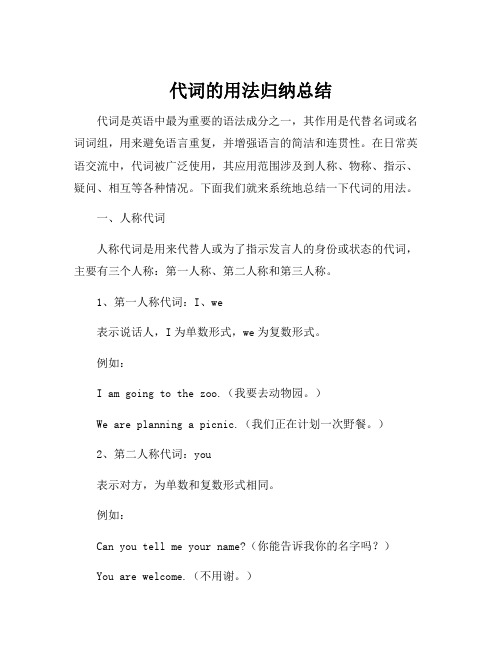
代词的用法归纳总结代词是英语中最为重要的语法成分之一,其作用是代替名词或名词词组,用来避免语言重复,并增强语言的简洁和连贯性。
在日常英语交流中,代词被广泛使用,其应用范围涉及到人称、物称、指示、疑问、相互等各种情况。
下面我们就来系统地总结一下代词的用法。
一、人称代词人称代词是用来代替人或为了指示发言人的身份或状态的代词,主要有三个人称:第一人称、第二人称和第三人称。
1、第一人称代词:I、we表示说话人,I为单数形式,we为复数形式。
例如:I am going to the zoo.(我要去动物园。
)We are planning a picnic.(我们正在计划一次野餐。
)2、第二人称代词:you表示对方,为单数和复数形式相同。
例如:Can you tell me your name?(你能告诉我你的名字吗?)You are welcome.(不用谢。
)3、第三人称代词:he, she, it, they表示第三人称,he 代表男性,she 代表女性,it 代表中性、物体、事物,they 代表复数形式。
例如:He is my brother.(他是我的兄弟。
)She loves reading.(她喜欢看书。
)It's a beautiful day.(天气真好。
)They are my friends.(他们是我的朋友。
)二、物品代词物品代词用来代替物品或事物,主要有三种:it、this 和 that。
1、it指物体或事物,常用于强调天气、时间、自然现象等。
例如:It is raining. (下雨了。
)It's late.(时间太晚了。
)2、this指离说话人近的事物,常用于接近或介绍一件事物。
例如:This is a pen.(这是一支笔。
)This is my hometown.(这是我的家乡。
)3、that指离说话人远的事物,指示重点在远处的物品。
例如:That is my car.(那是我的车。
代词的用法归纳总结

代词的用法归纳总结1.主格代词作为主语或主语补语出现。
如:I am a student. He is tall.2.宾格代词作为直接宾语,间接宾语或介词宾语出现。
如:Mary gave me a book. She talked to him. The cat is playing with them.3.形容词性物主代词用来修饰名词,表示名词的所有者。
如:My book is on the table. His hat is black.4.名词性物主代词直接代替名词,表示名词所代表的意义。
如:My is here. Yours is over there.5.反身代词表示做主语的人或物同时也是动词的宾语,为自己而行动或受到影响。
如:I hurt myself. She taught herself to drive.6.强调代词用来强调在句子中重要的部分。
如:It was John who won the game. I myself will finish the work.7.关系代词引导定语从句并在从句中担任主语、宾语或表语。
如:The girl who stands next to you is my sister.8.疑问代词用于疑问句中,用来代替并询问事物的种类、数量、性质等。
如:What is your name? How much does it cost?拓展:在口语中,有时会使用“they”代替“he/she”来避免性别歧视和麻烦。
例如:If someone wants to lend money, they have to show proof of income.此外,在一些方言或英语口音中,也会出现一些不规范的代词用法。
英语代词的用法总结

英语代词的用法总结代词在英语中扮演着非常重要的角色,它们用于代替名词,从而避免过度重复,并且使句子更加流畅和简洁。
本文将对英语代词的用法进行详细的总结。
一、人称代词:人称代词用于代替特定的人或物。
在英语中,人称代词有三个人称:第一人称(I、we)、第二人称(you)和第三人称(he、she、it、they)。
1. 第一人称代词(I、we)用于表达说话者自己。
例如:I am a student.(我是一个学生。
)We are going to the movies.(我们要去看电影。
)2. 第二人称代词(you)用于称呼对方或者对多个人说话。
例如:You are my best friend.(你是我最好的朋友。
)Are you ready?(你准备好了吗?)3. 第三人称代词(he、she、it、they)用于代替他人或物。
例如:He is my brother.(他是我的弟弟。
)She loves to sing.(她喜欢唱歌。
)It is a beautiful day.(今天天气很好。
)They are coming to visit tomorrow.(他们明天要来访问。
)二、指示代词:指示代词用于指示远离或靠近说话者的人或物。
英语中的指示代词包括:this、that、these、those。
1. this:用于指代靠近说话者的人或物。
例如:This is my car.(这是我的车。
)2. that:用于指代远离说话者的人或物。
例如:That is your book.(那是你的书。
)3. these:用于指代靠近说话者的复数人或物。
例如:These are my friends.(这些是我的朋友。
)4. those:用于指代远离说话者的复数人或物。
例如:Those are their houses.(那些是他们的房子。
)三、反身代词:反身代词用于表示动作反映回自身的动作。
在英语中,反身代词以“-self”或“-selves”结尾,如myself、yourself、himself、herself、itself、ourselves、yourselves、themselves。
初中英语代词知识点总结
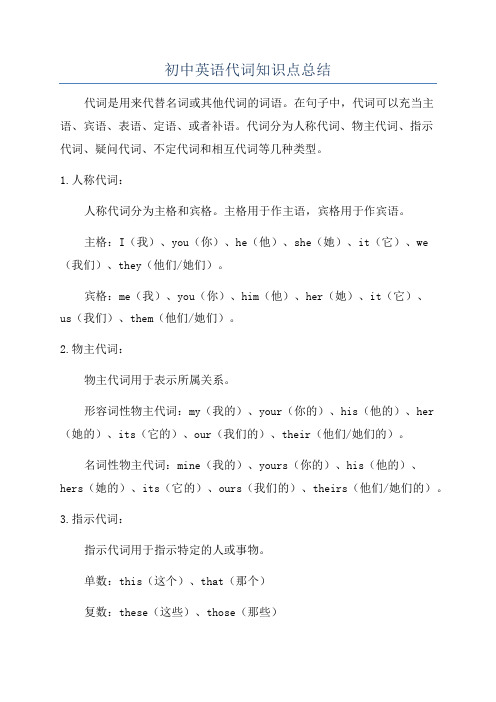
初中英语代词知识点总结代词是用来代替名词或其他代词的词语。
在句子中,代词可以充当主语、宾语、表语、定语、或者补语。
代词分为人称代词、物主代词、指示代词、疑问代词、不定代词和相互代词等几种类型。
1.人称代词:人称代词分为主格和宾格。
主格用于作主语,宾格用于作宾语。
主格:I(我)、you(你)、he(他)、she(她)、it(它)、we (我们)、they(他们/她们)。
宾格:me(我)、you(你)、him(他)、her(她)、it(它)、us(我们)、them(他们/她们)。
2.物主代词:物主代词用于表示所属关系。
形容词性物主代词:my(我的)、your(你的)、his(他的)、her (她的)、its(它的)、our(我们的)、their(他们/她们的)。
名词性物主代词:mine(我的)、yours(你的)、his(他的)、hers(她的)、its(它的)、ours(我们的)、theirs(他们/她们的)。
3.指示代词:指示代词用于指示特定的人或事物。
单数:this(这个)、that(那个)复数:these(这些)、those(那些)4.疑问代词:疑问代词用于引导疑问句。
主格:who(谁)、what(什么)宾格:whom(谁)5.不定代词:不定代词指代不特定的人或事物。
some(一些)、any(一些)、no(没有)、none(没有人/物)、something(事)、anybody(任何人)6.相互代词:相互代词指互相之间的关系。
each other(彼此)、one another(互相)在运用代词时,要注意代词的数(单数/复数)、格(主格/宾格)、性(男/女/中性)、以及与名词之间的一致性等规则。
通过多练习和阅读,可以更好地掌握代词的用法。
初二英语语法填空中代词的考法
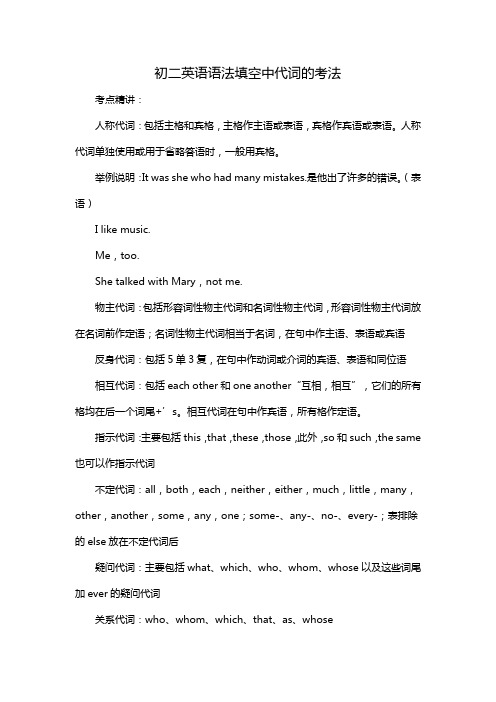
初二英语语法填空中代词的考法考点精讲:人称代词:包括主格和宾格,主格作主语或表语,宾格作宾语或表语。
人称代词单独使用或用于省略答语时,一般用宾格。
举例说明:It was she who had many mistakes.是他出了许多的错误。
(表语)I like music.Me,too.She talked with Mary,not me.物主代词:包括形容词性物主代词和名词性物主代词,形容词性物主代词放在名词前作定语;名词性物主代词相当于名词,在句中作主语、表语或宾语反身代词:包括5单3复,在句中作动词或介词的宾语、表语和同位语相互代词:包括each other和one another“互相,相互”,它们的所有格均在后一个词尾+’s。
相互代词在句中作宾语,所有格作定语。
指示代词:主要包括this,that,these,those,此外,so和such,the same 也可以作指示代词不定代词:all,both,each,neither,either,much,little,many,other,another,some,any,one;some-、any-、no-、every-;表排除的else放在不定代词后疑问代词:主要包括what、which、who、whom、whose以及这些词尾加ever的疑问代词关系代词:who、whom、which、that、as、whose考查重点:对不定代词some,any,none,no one,other,the other,neither,either,both等的区分;区分指示代词it,this,that,these,those,one,ones等的不同替代作用。
考点精讲:人称代词:包括主格和宾格,主格作主语或表语,宾格作宾语或表语。
人称代词单独使用或用于省略答语时,一般用宾格。
举例说明:It was she who had many mistakes.是他出了许多的错误。
英语代词的分类和用法

英语代词的分类和用法摘要英语代词是用来代替名词或其他词类的词,它们可以根据其意义和用法分为以下八种:人称代词、物主代词、反身代词、指示代词、疑问代词、连接代词、关系代词和不定代词。
本文将介绍这八种代词的定义、形式、功能和用法,并给出一些例句和表格来帮助理解和记忆。
一、人称代词人称代词是用来指代人或事物的代词,它们有单复数和主宾格之分。
主格用作主语,宾格用作宾语或同位语。
下表列出了人称代词的形式:单数主格宾格第一人称I me第二人称you you第三人称he/she/it him/her/it复数主格宾格第一人称we us第二人称you you第三人称they them例如:He likes playing football, but she prefers basketball. 他喜欢踢足球,但她更喜欢篮球。
They invited us to their party, but we didn't go with them. 他们邀请我们去他们的聚会,但我们没有和他们一起去。
二、物主代词物主代词是用来表示所属关系的代词,它们分为形容词性物主代词和名词性物主代词。
形容词性物主代词用作定语,修饰名词;名词性物主代词用作主语、宾语、表语或定语,后面不跟名词。
下表列出了物主代词的形式:单数形容词性物主代词名词性物主代词第一人称my mine第二人称your yours第三人称his/her/its his/hers/its复数形容词性物主代词名词性物主代词第一人称our ours第二人称your yours第三人称their theirs例如:This is my book, and that is your book. 这是我的书,那是你的书。
The book is mine, not yours. 这本书是我的,不是你的。
He is a friend of mine. 他是我的一个朋友。
三、反身代词反身代词是用来表示动作的执行者和承受者是同一人或事物的代词,也可以用来加强语气。
初中英语语法代词讲解

初中英语语法代词讲解Newly compiled on November 23, 2020初中英语语法代词代词:为了避免重复而用来代替其他词的词。
种类:1) 人称 2) 物主 3) 反身4) 指示 5)不定6) 疑问7) 相互代词:each other, one another互相,其所有格加-’s8) 关系代词:which, who,that,whom,whose等引导定语从句9) 连接代词:who, whom, whose, what, which, whatever, whichever, whoever, whomever10)替代词:one(单数), ones(复数)用于替代前面出现的同类事物。
但ones必须和形容词连用。
如果替代的名词时无形容词在前,则用some, any,而不用ones。
如:Have you bought any rulers Yes,I 've bought some.一、人称代词1.人称代词的形式2.人称代词的句法功能3.人称代词的排列顺序(单数231,复数123)当两个以上的人称代词一起作主语时,单数按二、三、一人称排列(即you, he / she, I);复数按一、二、三人称排列(即we, you, they)。
但是如果做错了事需要承担责任时,要把说话人(I)放在第一位。
如:It was I and John that made her angry. 是我和约翰惹她生气了。
二、物主代词1.物主代词的形式2.物主代词的基本用法3.物主代词的特殊用法在双重所有格中只能用名词性物主代词。
如:我的一个朋友a friend of mine ,她的一个同学 a classmate of hers , each brother of his.三、反身代词1.反身代词的形式反身代词又叫自身代词,表示动作返回到动作发出者本身。
2.反身代词的句法功能3.由反身代词构成的习惯用语①help oneself to 随便吃……②come to oneself 苏醒过来,醒悟,恢复知觉③dress oneself 自己穿衣服④say to oneself 自言自语⑤enjoy oneself 玩得开心⑥lose oneself in迷路于,全神贯注于…之中,消失于⑦teach oneself 自学⑧look after oneself ⑨by oneself 亲自learn……by oneself 自学…leave one by oneself 把某人单独留下hurt oneself 伤了自己make yourself/yourselves at home 不必拘束四、指示代词1. that 用来代替前面提到的不可数名词,those代替复数名词。
代词用法总结

代词用法总结代词是语言中一类非常重要的词类,它们在句子中起到代替名词的作用。
正确使用代词可以使文章更加简洁、流畅,避免重复使用名词。
本文将总结代词的用法,并给出一些例子来帮助读者更好地理解。
一、人称代词人称代词用来代替特定的人或事物。
它们分为主格和宾格两种形式,主格用于主语位置,宾格用于宾语位置。
例如:- 主格:我、你、他、她、它、我们、你们、他们- 宾格:我、你、他、她、它、我们、你们、他们1. 主格人称代词用于主语位置:- 例句1:我喜欢读书。
- 例句2:他是我的好朋友。
2. 宾格人称代词用于宾语位置:- 例句1:请你帮助我。
- 例句2:我看到了他。
二、指示代词指示代词用来指示特定的人或事物,分为近指和远指两种形式。
例如:- 近指:这、这个、这些- 远指:那、那个、那些1. 近指代词用于指示离说话人较近的人或事物:- 例句2:这些是我们的家人。
2. 远指代词用于指示离说话人较远的人或事物:- 例句1:那是他的车。
- 例句2:那些是他们的房子。
三、反身代词反身代词用于强调动作的承受者是动作的执行者本身。
例如:- 反身代词:自己、自己的、自己们的1. 反身代词用于强调动作的承受者是动作的执行者本身:- 例句1:他自己做的饭非常好吃。
- 例句2:她们自己动手装饰了房间。
四、物主代词物主代词用来表示所属关系,分为形容词性物主代词和名词性物主代词两种形式。
例如:- 形容词性物主代词:我的、你的、他的、她的、它的、我们的、你们的、他们的- 名词性物主代词:我的、你的、他的、她的、它的、我们的、你们的、他们的1. 形容词性物主代词用于修饰名词:- 例句1:我的书丢了。
2. 名词性物主代词用于作主语或宾语:- 例句1:这本书是我的。
- 例句2:这是他们的房子。
五、疑问代词疑问代词用来提问特定的人或事物,分为主格和宾格两种形式。
例如:- 主格:谁、什么、哪个、哪些- 宾格:谁、什么、哪个、哪些1. 主格疑问代词用于提问主语:- 例句1:谁是你的朋友?- 例句2:哪个是你的车?2. 宾格疑问代词用于提问宾语:- 例句1:你认识谁?- 例句2:你想要什么?六、不定代词不定代词用来代替不确定的人或事物,包括一些常见的不定代词,如:所有代词、一些代词、另一些代词等。
八年级英语上册代词用法汇总(含例句分享)

八年级英语上册代词用法汇总(含例句分享)代词的分类:人称代词、物主代词、反身代词、指示代词、关系代词、疑问代词、连接代词和不定代词等。
1、人称代词:人称代词代替人和事物的名称,分为主格和宾格两种形式。
(1)主格用来作句子的主语、表语。
I often go shopping on Sundays.(星期天我常去购物)Are they from Brazil?(他们是巴西人吗?)Where have they gone?(他们上哪儿去了?)It’s he!(是他!)(2)宾格用来作及物动词或者介词的宾语。
Who teaches you English this year?(今年谁教你们的英语?)Help me!(救救我!)We often write letters to her.(我们常给他写信)(3)人称代词作表语或者放在比较状语从句连词than或as之后时,可以用主格形式,也可以用宾格形式,口语中大多用宾格。
–It’s I/me.(是我。
)(4)三个不同人称同时出现,或者主语中包含“我”时,按照“you→he→I”的顺序表达。
Both he and I are working at that computer company.(我和他都在那家电脑公司上班)–Who will go there?(谁要去那儿?)–You and me.(你和我)(5)人称代词it除了可以指人指物之外,还可以表示“时间、天气、温度、距离、情况”等含义,此外还可以作“非人称代词”使用,替代作主语或者宾语的不定式、动名词或者名词性从句。
--What’s the time?(几点啦?)–It’s 12:00.(12点)It’s a long way to go.(那可要走好长的路)It took him three days to clean his house..(打扫屋子花了他三天的时间)It is very clear that the public want to know when these men can go into space(很显然,公众想知道这些人什么时候能进入太空)2、物主代词:说明事物所属关系的代词,分为形容词性和名词性两种。
英语语法代词用法

英语语法-代词用法代词是英语中的一类词汇,用来代替名词或名词短语。
代词的使用可以简化句子结构,使其更加简洁明了。
在英语语法中,代词有多种用法,下面将详细介绍代词的用法。
首先,代词可以用来指代一个名词。
例如,我们可以用主格代词来代替主语,如he、she、it等。
例如,原句是"I am going to the store",我们可以用代词"He"来代替主语"I",得到"He is going to the store"。
在这个例子中,代词"He"代替了名词"I",使句子更加简洁。
其次,代词也可以用来指代一个名词的所有格形式。
例如,我们可以用所有格代词来代替名词的所有格形式,如mine、yours、hers等。
例如,原句是"This is John's car",我们可以用代词"mine"来代替名词所有格形式"John's",得到"This car is mine"。
在这个例子中,代词"mine"代替了名词所有格形式"John's",使句子更加简洁。
此外,代词还可以用来指代一个名词的宾格形式。
例如,我们可以用宾格代词来代替名词的宾格形式,如me、you、him等。
例如,原句是"She gave the book to me",我们可以用代词"her"来代替宾格形式"me",得到"She gave the book to her"。
在这个例子中,代词"her"代替了名词宾格形式"me",使句子更加简洁。
还有一种常见的代词用法是反身代词。
代词用法总结

代词用法总结代词是指代名词的词语,用于代替具体的名词或名词词组,以避免重复使用同一个名词。
代词在英语中扮演着非常重要的角色,正确使用代词可以使语言更加简洁明了。
本文将总结并介绍常见的代词用法。
一、人称代词人称代词用于代替人或事物,根据人称和数量的不同可以分为主格、宾格和所有格三种形式。
1. 主格代词主格代词作为主语出现在句子中,常见的主格代词有:I、you、he、she、it、we、they等。
例句:- I love to read.(我喜欢阅读。
)- You are my best friend.(你是我最好的朋友。
)- He is a talented musician.(他是一个有才华的音乐家。
)2. 宾格代词宾格代词在句子中作为动词或介词的宾语出现,常见的宾格代词有:me、you、him、her、it、us、them等。
例句:- John called me yesterday.(约翰昨天给我打电话。
)- Can you lend me your pen?(你能借给我你的钢笔吗?)3. 所有格代词所有格代词表示所有关系,用于表示所属关系,常见的所有格代词有:mine、yours、his、hers、its、ours、theirs等。
例句:- The red car is mine.(那辆红色的汽车是我的。
)- Is this book yours?(这本书是你的吗?)二、指示代词指示代词用来指示人或事物的位置或距离,常见的指示代词有:this、that、these、those等。
1. this和thatthis用于指示离说话人近的人或物,that用于指示离说话人远的人或物。
例句:- This is my new phone.(这是我的新手机。
)- That building is very tall.(那座建筑很高。
)2. these和thosethese用于指示离说话人近的复数人或物,those用于指示离说话人远的复数人或物。
英语中代词的分类与用法
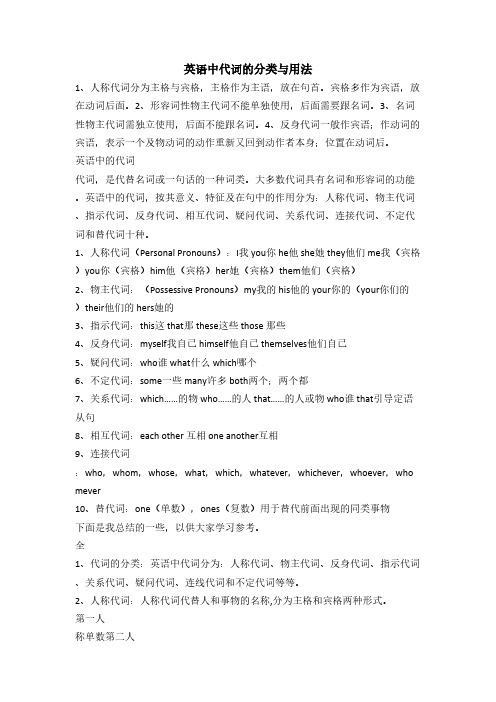
英语中代词的分类与用法1、人称代词分为主格与宾格,主格作为主语,放在句首。
宾格多作为宾语,放在动词后面。
2、形容词性物主代词不能单独使用,后面需要跟名词。
3、名词性物主代词需独立使用,后面不能跟名词。
4、反身代词一般作宾语;作动词的宾语,表示一个及物动词的动作重新又回到动作者本身;位置在动词后。
英语中的代词代词,是代替名词或一句话的一种词类。
大多数代词具有名词和形容词的功能。
英语中的代词,按其意义、特征及在句中的作用分为:人称代词、物主代词、指示代词、反身代词、相互代词、疑问代词、关系代词、连接代词、不定代词和替代词十种。
1、人称代词(Personal Pronouns):I我 you你 he他 she她 they他们 me我(宾格)you你(宾格)him他(宾格)her她(宾格)them他们(宾格)2、物主代词:(Possessive Pronouns)my我的 his他的 your你的(your你们的)their他们的 hers她的3、指示代词:this这 that那 these这些 those 那些4、反身代词:myself我自己 himself他自己 themselves他们自己5、疑问代词:who谁 what什么 which哪个6、不定代词:some一些 many许多 both两个;两个都7、关系代词:which……的物 who……的人 that……的人或物 who谁 that引导定语从句8、相互代词:each other 互相 one another互相9、连接代词:who,whom,whose,what,which,whatever,whichever,whoever,who mever10、替代词:one(单数),ones(复数)用于替代前面出现的同类事物下面是我总结的一些,以供大家学习参考。
全1、代词的分类:英语中代词分为:人称代词、物主代词、反身代词、指示代词、关系代词、疑问代词、连线代词和不定代词等等。
初中英语人称代词用法

初中英语人称代词用法
初中英语人称代词的用法
一、人称代词的五种基本形式:
二、人称代词的基本用法:
1.主格:用作句子的主语,放在动词前(疑问句式放在特殊动词后)
.
2.宾格:用作句子的宾语,放在动词或介词后
初中英语人称代词用法
a .
3.形容词性物主代词:用作句子的定语,之后必须带名词
. ’s .
4.名词性物主代词形容词性物主代词+名词:相当于一个名词词组,之
后不能带名词
(= ).
5.反身代词:一般放在动词后,要求同主语人称一致
玩得开心随便吃自己穿衣服独自自学照顾自
己受伤。
八年级英语代词用法总结
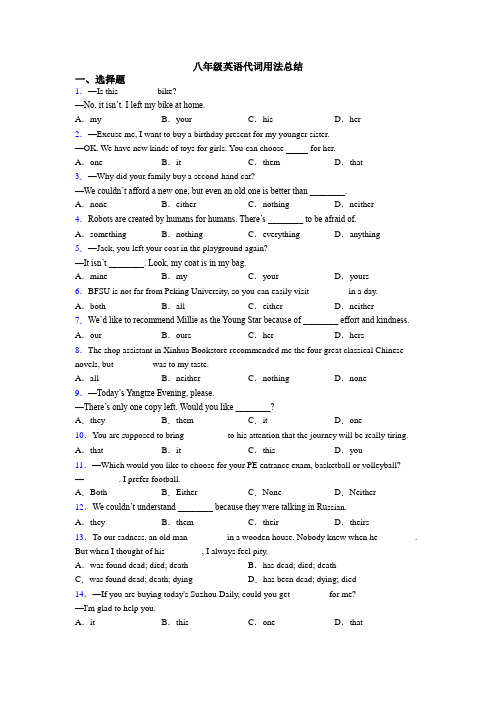
八年级英语代词用法总结一、选择题1.—Is this ________ bike?—No, it isn’t. I left my bike at home.A.my B.your C.his D.her 2.—Excuse me, I want to buy a birthday present for my younger sister.—OK. We have new kinds of toys for girls. You can choose for her.A.one B.it C.them D.that3.—Why did your family buy a second-hand car?—We couldn’t afford a new one, but even an old one is better than ________.A.none B.either C.nothing D.neither 4.Robots are created by humans for humans. There’s ________ to be afraid of. A.something B.nothing C.everything D.anything 5.—Jack, you left your coat in the playground again?—It isn’t ________. Look, my coat is in my bag.A.mine B.my C.your D.yours6.BFSU is not far from Peking University, so you can easily visit ________ in a day.A.both B.all C.either D.neither7.We’d like to recommend Millie as the Young Star because of ________ effort and kindness. A.our B.ours C.her D.hers8.The shop assistant in Xinhua Bookstore recommended me the four great classical Chinese novels, but ________ was to my taste.A.all B.neither C.nothing D.none 9.—Today’s Yangtze Evening, please.—There’s only one copy left. Would you like ________?A.they B.them C.it D.one10.You are supposed to bring _________ to his attention that the journey will be really tiring. A.that B.it C.this D.you 11.—Which would you like to choose for your PE entrance exam, basketball or volleyball?—________. I prefer football.A.Both B.Either C.None D.Neither12.We couldn’t understand ________ because they were talking in Ru ssian.A.they B.them C.their D.theirs13.To our sadness, an old man ________ in a wooden house. Nobody knew when he ________. But when I thought of his ________, I always feel pity.A.was found dead; died; death B.has dead; died; deathC.was found dead; death; dying D.has been dead; dying; died14.—If you are buying today's Suzhou Daily, could you get ________ for me?—I'm glad to help you.A.it B.this C.one D.that15.My mother tried to cook ________ for me when I studied in New Zealand.A.different something B.different anything C.something different D.anything different 16.—Dave, did you have fun at the New Year's Party?—Sure! I will never forget each wonderful memory of ________.A.we B.us C.our D.ours17.Miss Liu is kind enough to help us whenever she is needed. We all like ______.A.she B.her C.him D.them 18.Though I agree with most of what you said, that doesn't mean I agree with _________. A.anything B.nothing C.everything D.something 19.—Sam, there are so many spelling mistakes in your paper. You should try not torepeat________.—Sorry, Mr. White. I'll be more careful from now on.A.it B.its C.them D.theirs20.Alice was very happy to see that the children were enjoying ________.A.himself B.herself C.ourselves D.themselves 21.Some friends tried to calm down Mr. and Mrs. White and help solve their problem without hurting the feeling of ________, but failed.A.both B.none C.either D.neither 22.—Jeffrey always remained calm and mastered his own feelings.—No wonder he is a ________.A.somebody B.anybody C.nobody D.everyone 23.He thinks himself ________, but we think him ________.A.somebody, anybody B.somebody, nobody C.anybody, somebody D.anybody, nobody 24.— The TV series Love Designer is the most romantic drama I have ever seen.—I’m afraid it’s not ________ cup of tea.A.anybody’s B.everybody’s C.somebody’s D.nobody’s 25.We all think ________ comfortable to live in Yancheng. It’s a beautiful and modern city. A.this B.that C.it D.what26.— There are more TV series than before.—That’s true. But ________ was to my taste. I prefer westerns.A.all B.few C.some D.none27.My elder brother is creative, he is always full of ideas, but ________ is useful to my knowledge.A.neither B.nothing C.no one D.none28.The teacher shared the photos of our school trip on her WeChat Moments. We can see them for ________.A.herself B.himself C.ourselves D.themselves 29.— Lucy, do you know whose wallet it is on the table?—Sorry, I don’t know. I asked many people, but ________ knew.A.nobody B.everybody C.anybody D.somebody30.—Though the film Hi, mom has achieved a great success, it isn’t liked by ________.—I think so. It is hard to please all.A.nobody B.somebody C.everybody D.anybody31.The girl got a new bike from her father and she loves ________ colour very much.A.it B.itself C.its D.it’s 32.—Excuse me, I want to buy a birthday gift for my brother.—Here are some gifts for boys. You can choose ________ for him.A.it B.one C.that D.them33.— Have you got any books on the differences between Chinese and Western festivals? I want to borrow one.— Yes, here you are. But you must return _______by Sunday.A.one B.it C.this D.that34.—He was the strong silent type.—Yes. He thought ________ better to say nothing.A.it B.its C.it’s D.itself35.—Few films have had a gre ater effect on popular culture than Steven Spielberg’s.—It’s just your cup of tea. To me, his works are ________ more than entertainment. A.something B.anything C.nothing D.everything 36.—Are there any air tickets to Hong Kong?—Sorry. There is ________ left.A.nothing B.none C.nobody D.no one37.Wu Xinhai, a stay-at-home dad in Beijing, said: “I want my kids to have a different childhood from ________.”A.my B.me C.myself D.mine38.It is wrong to copy others’ answers. Do homework by ________, boys!A.yourself B.yourselves C.myself D.ourselves 39.—The apples are quite delicious! Can I have one more?—Sorry, there is ________ left, what about some oranges?A.none B.no one C.nothing D.nobody40.As the old saying goes, politeness costs nothing and gains ________.A.nothing B.anything C.everything D.something【参考答案】一、选择题1.B解析:B【详解】句意:——这是你的单车吗?——不,不是我的。
八年级英语中代词的用法归纳总结

八年级英语中代词的用法归纳总结一、选择题1.—If you are buying today's Suzhou Daily, could you get ________ for me?—I'm glad to help you.A.it B.this C.one D.that2.Wearing red makes________easy________us to take action.A.it; for B.this; of C.that; for D.it; of 3.—Where would you like to have a picnic, near Yangcheng Lake or in Forest Park?— ________ . You decide. I just want to relax myself in the beautiful nature.A.Either B.Neither C.Both D.None 4.Believe in yourself. Do this and no matter where you are, you will have ________ to fear. A.nothing B.something C.anything D.everything 5.— Lucy, do you know whose wallet it is on the table?—Sorry, I don’t know. I asked many people, but ________ knew.A.nobody B.everybody C.anybody D.somebody 6.—Do we have any bananas for the party?—Let me see. Yes, but only ________.A.a few B.few C.a little D.little7.Bob recommended me several foreign films, but ________ was to my taste.A.neither B.no one C.none D.nothing 8.—Wow! Jim plays the piano so well.—Not ________ can play it like this. He works hard at it.A.everybody B.somebody C.nobody D.anybody9.Wu Xinhai, a stay-at-home dad in Beijing, said: “I want my kids to have a different childhood from ________.”A.my B.me C.myself D.mine10.Alice was very happy to see that the children were enjoying ________.A.himself B.herself C.ourselves D.themselves 11.We found ________ easy to finish the task by working as a team.A.it’s B.that C.this D.it12.—Which of the two dresses will you choose for the party?—________ of them is suitable for a birthday party. They are too formal.A.Neither B.None C.Either D.Both 13.Teachers use ________ knowledge to help children become intelligent teenagers.A.they B.them C.their D.theirs14.My mother tried to cook ________ for me when I studied in New Zealand.A.different something B.different anything C.something different D.anything different 15.It’s known to all that the Chinese are famous for ________ hard work and wisdom. A.they B.them C.their D.themselves 16.Miss Liu is kind enough to help us whenever she is needed. We all like ______.A.she B.her C.him D.them17.—Are these cars made in Japan?—Yes, and they’re much cheaper than ___________ in American.A.that B.those C.it D.ones18.It’s very convenient ______ us to buy train tickets now because we can b uy them either from the station or on the Internet.A.to B.of C.by D.for19.Your home town is really nice!The air quality is as good as______of Sanya.A.it B.one C.that D.the one 20.—Jack, you left your coat in the playground again?—It isn’t ________. Loo k, my coat is in my bag.A.mine B.my C.your D.yours21.My parents have made ________ a habit to go out for a walk around Xuanwu Lake.A.this B.it C.that D.one22.—Jeffrey always remained calm and mastered his own feelings.—No wonder he is a ________.A.somebody B.anybody C.nobody D.everyone23.The key to success is to start where you are, not when things get better, not if things were different, nor if you had what ________ else has.A.something B.anything C.somebody D.anybody 24.Some friends tried to calm down Mr. and Mrs. White and help solve their problem without hurting the feeling of ________, but failed.A.none B.either C.both D.neither25.He thinks himself ________, but we think him ________.A.somebody, anybody B.somebody, nobody C.anybody, somebody D.anybody, nobody 26.They have provided several ways to solve the problem. We can choose _________ to start with.A.it B.that C.one D.each27.As a child, I would sit for hours under an old tree doing ________, which was simply day dreaming.A.nothing B.everything C.something D.anything28.Wu Xinhai, a stay-at-home dad, said “I want my kids to have a different childhood from________.”A.me B.mine C.myself D.I29.—The apples are quite delicious! Can I have one more?—Sorry, there is ________ left, what about some oranges?A.none B.no one C.nothing D.nobody 30.—This book on Yancheng’s history is interesting. I’d like______. Where did you buy it, Tom? —In the Amazon Bookstore.A.it B.this C.that D.one31.—Excuse me, Linda, but which is for me?—You can take ________ half. They are exactly the same.A.any B.either C.neither D.both32.The chairman thought ________ necessary to invite Professor Johnson to speak at the meeting.A.that B.it C.this D.him33.— When would you like to go to Nanjing Garden Expo (园博园) with me, this Friday or Saturday?— ________. I am free only this Sunday.A.Both B.None C.Neither D.Either34.Dora always comes up with new ideas, but ________ is of any value to me.A.none B.nothing C.no one D.neither 35.—Though the film Hi, mom has achiev ed a great success, it isn’t liked by ________.—I think so. It is hard to please all.A.nobody B.somebody C.everybody D.anybody 36.—Excuse me, I want to buy a birthday gift for my brother.—Here are some gifts for boys. You can choose ________ for him.A.it B.one C.that D.them 37.—Excuse me, is there a supermarket nearby?—I know ________. I will take you there.A.it B.one C.some D.that38.If something is wrong, fix it. Do not worry. Worry never fixes ________.A.something B.anything C.nothing D.everything 39.—Few films have had a greater effect on popular culture than Steven Spielberg’s.—It’s just your cup of tea. To me, his works are ________ more than entertainment. A.something B.anything C.nothing D.everything 40.— Who was calling you on the phone just now?— ________ was my mum.A.She B.That C.It D.This【参考答案】一、选择题1.C解析:C【详解】句意:——如果你要买今天的《苏州日报》,能帮我买一份吗?——我很乐意帮助你。
- 1、下载文档前请自行甄别文档内容的完整性,平台不提供额外的编辑、内容补充、找答案等附加服务。
- 2、"仅部分预览"的文档,不可在线预览部分如存在完整性等问题,可反馈申请退款(可完整预览的文档不适用该条件!)。
- 3、如文档侵犯您的权益,请联系客服反馈,我们会尽快为您处理(人工客服工作时间:9:00-18:30)。
his
我们 的
你的
你们的
他 的
hers 她的
its
theirs
它 的
他们的
My name is Mary.
Miss sun is our English teacher.
These are their books . This is my pen , and that is yours.
yours=your pen
1.MIyfavourite subject is Chinese. I 改为 My
2.Is the shirt on the bed yyoouurrs ? your改为yours
3.I have a good friend , shheer name is Lily.
she 改为 her
4.This red T-shirt isn't Helen's . HHeerrs is blue. Her 改为 Hers
5.The two little girls are crying . They can't find tthheemir mother.
them 改为 their
三.反身代词
myself yourself
1.反身代词是表示“我(们)自己” “你(们)自己” “他 (们)自己” “ 他/她它(们)自己”的代词
herself 她自己
themselves 他/她/它们自己
itself 它自己
hurt oneself 伤了某人自己
1.The man fell off his bike and hurt ____h_im__s_el_f_____.(he)
teach oneself 自学
2.I teach __m_y_s_e_l_f __(I) French.
Can I use your computer? Mine is broken. mine=my computer
结论:1.形容词性物主代词___不__能___(能/不能)单独使用,后必须
接___名__词___。
2.名词性物主代词__能____单独使用。后_不___用__接名词。 3.名词性物主代词=__形__容__词__性___物__主__代__词___+_名___词____。
by oneself 独自
3.She finished the work by __h_e_r_s_el_f___(she).
look after oneself 照顾自己
4.Most of the old people live alone now, so they have to
look after _t_h_em__s_e_lv_e_s___(they).
一.人称代词 二.物主代词 三.反身代词 四.指示代词
五.不定代词 六.疑问代词 七.连接代词 八、关系代词
一.人称代词
1.人称代词是表示“我(们)” “你(们)” “他(们) “她(们)” “它(们)”的词。
2.用来指人或者物的代词,人称代词有主格,宾格。
数 格人称
第一人称 第二人称
第三人称
单数
主格
宾格
I
me
you
you
he
him
she
her
it
it
复数
主格
宾格
we
us
you
you
they
them
人称代词(主格,宾格)的用法
I'm a teacher. He is my student We are all Chinese My parents love me , and I love them , too . English is my favourite subject , and I'm good at it.
结论:1.主格代词作__主__语___,放在__句__首___(动词前)。 2.宾格代词作__宾__语___,放在__动__词__或__介__词_后__。
Miss Sun teachs__u__s____(we) English very well.In class,__s_h__e__(she)is strict with ____u__s__(we).After class,she is our good friend. I like English , but ____I_____(I) am not good at ____it____ (it) . So Miss Sun often helps _______m(I)e with my English . We all like _______h(esrhe) .
学科:英语
授课人:
英语中的单词分几类?
实词
词
有实在意义,在句子中能独立承担句子成分。
虚词
无实际意义,在句子中不能独立承担句子成分
英语中的单词分几类?
ห้องสมุดไป่ตู้
名词 n. 代词 pron.
实词
数词 num. 动词 v.
词
形容词 adj. 副词 adv.
代替名词,形容词或数词 表示数量和顺序 表示动作或状态 修饰名词,表示人,物的特征 修饰动词,形容词或其他副词
2.第一,二人称反身代词由形容词性物主代词+self/selves 构成,第三人称反身代词由人称代词宾格+self/selves构成
人 称
分 类
单 数
复数
第一人称
myself 我自己
ourselves 我们自己
第二人称
yourself 你自己
yourselves 你们自己
第三人称
himself 他自己
虚词
冠词 art. 介词 prep. 连词 conj. 感叹词 interj.
用在名词前,说明名词指的人,物 表示名词,代词等与其他词的关系 连接词与词,短语和短语,句子和句子 表示说话时的感情或口气
your
they this
it mine
my yours
he
代词是代替名词及其名词作用的短语及句子 的词
二.物主代词
1.物主代词是用来表示所有人与物的关系的,即指事物的主 人(我的,你的,他的)。
2.分为形容词性物主代词和名词性物主代词
人称
第一人称
第二人称
第三人称
分类
形容词 性
单数
my
复数
单数
our
your
复数
your
单数
复数
his
her
its
their
名词性
mine
词意
我的
ours
yours
yours
词类
实词
代词
主格&宾格
人称代词 物主代词
形容词&名词性
反身代词
A. 从括号内选择正确的代词填空 1. Your clothes are on the desk. Please put _________(they,them,their,theirs) away. 2. (We,Us,Our,Ours)_________ English teacher is Mrs. Green. We all like _________(she,her,hers). 3. (I,Me,My,Mine)_________ can't get my kite. Could you help _________(I,me,my,mine)? 4. Tom can't get down from the tree. Can you help _________(he,him,his)? 5. Her kite is broken. Can _________(you,your,yours) mend it? 6. We can't find our bikes. Can you help _________(we,us,our,ours)?
